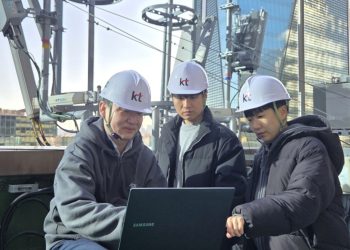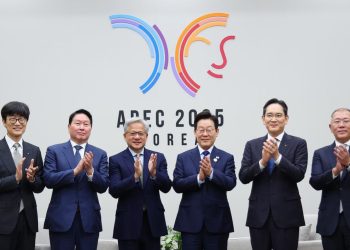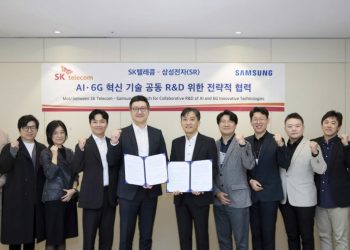Pyeongtaek Plant 5 and AI data centres to anchor South Korea’s tech future
Samsung has announced a record $310 billion investment plan over the next five years, targeting semiconductors, AI infrastructure and next-generation technologies. The move has shown rising global demand for AI computing and strengthened geopolitical competition over chip supply.
A major portion of the capital will be channelled into semiconductor manufacturing. The Group will construct Pyeongtaek Plant 5, a high-bandwidth memory (HBM) and server DRAM production line — critical components used in AI data centres and generative AI models. Located at Samsung’s Pyeongtaek campus, the facility is scheduled to begin operations in 2028, expanding Samsung’s role in global chip supply chains.
Beyond Semiconductors: Building a National Tech Ecosystem
Samsung’s investment strategy goes further than chip manufacturing. The company is developing a nationwide tech infrastructure, with plans to build two AI data centres — one in South Jeolla and another in Gumi.
- South Jeolla facility: Will feature 15,000 GPUs by 2028 and be open to universities, SMEs and startups.
- Gumi facility: Will focus on Samsung’s own AI training and R&D efforts.
Industry experts say the Jeolla data centre could become “one of Asia’s most powerful AI computing hubs,” signalling the expansion of advanced digital infrastructure beyond Seoul.
Boosting Regional Development
The decentralised approach is designed to stimulate regional economic growth and support local manufacturing. Samsung SDS is deploying infrastructure across multiple provinces, while Samsung SDI is exploring the creation of a domestic all-solid-state battery production line, likely in Ulsan. This battery technology is considered a potential breakthrough for next-generation electric vehicles due to its higher safety and energy density.
Meanwhile, Samsung Display is preparing mass production of 8.6-generation OLED panels at its Asan facility, targeting growing demand for high-end IT devices.
Strengthening Supply Chains and Production Reliability
Part of the investment will target supply chain stability — a growing concern for industry players amid shifting geopolitics. Samsung Electro-Mechanics will scale up production of advanced packaging substrates for servers powering AI workloads. The Group will also invest in infrastructure to ensure stable operations at Pyeongtaek Plant 5 once production begins in 2028.
The revival of the plant comes after a period of delay caused by weak market demand. With AI-driven chip orders rising, Samsung decided to restart the project following approval from its emergency management committee, which also confirmed plans to create 60,000 domestic jobs over the next five years.
Aligned With National Technology Goals
Samsung’s plan aligns closely with South Korea’s national strategy. President Lee Jae Myung has pledged to triple government spending on AI next year and make South Korea one of the top three AI powers, alongside the United States and China. Analysts say Samsung’s multi-sector investment across AI, semiconductors, hydrogen, robotics and batteries will be critical to achieving that ambition.
“This investment positions South Korea as a long-term leader in AI, mobility and advanced manufacturing,” said one industry analyst.
“It also helps reduce overreliance on foreign supply chains — a key concern for both industry and government.”
AI Moves Into Manufacturing
Samsung is not only building AI infrastructure — it intends to embed AI into manufacturing itself. The company recently revealed plans to develop an AI megafactory with Nvidia, using over 50,000 GPUs to infuse AI into every stage of semiconductor production, from design and equipment management to quality control.
Analysts say this marks a shift towards AI-powered industrial operations, positioning Samsung as a leader not just in AI hardware, but in AI-driven manufacturing — a key advantage in future global competition.
A Strategic Bet on the Next Era of Technology
Samsung’s $310 billion plan signals a major shift in South Korea’s industrial strategy — away from traditional manufacturing and toward next-generation technologies. If successful, it could redefine the country’s role in AI supply chains and global tech competitiveness.






